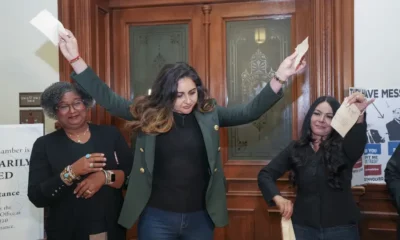News from the South - Virginia News Feed
Va. governors make board appointments; legislators confirm them. How’s the process work?
by Nathaniel Cline, Virginia Mercury
July 14, 2025
Republican Gov. Glenn Youngkin and Virginia Democrats have brokered many deals during his soon-ending four-year term, but have also frequently been at odds on policy issues, reflected most recently in the legislature’s rejection of several of the governor’s appointments to Virginia’s governing boards and commissions.
Virginia law gives governors the power to appoint and remove people to these groups. Like his predecessors, Youngkin has appointed hundreds of people to serve on roughly 300 public commissions and boards.
Over the past year, Senate Democrats have rejected 30 of Youngkin’s appointments to boards and commissions, primarily to the Board of Education and governing boards at Virginia’s public higher education institutions. That is three times as many appointees as the legislature blocked during former Democratic Gov. Ralph Northam’s administration, which ended in 2022.
Senate Democrats sue over Youngkin appointees kept on college boards
Now, the board appointments process is being debated publicly and will soon play out in the Fairfax County Courthouse, as officials decide whether the rejected appointees can still serve.
To better understand how the process works, the Mercury spoke with two professors from the University of Richmond and Virginia Commonwealth University about the state laws girding up gubernatorial appointment confirmations.
How may someone be appointed to a governing board or commission?
A candidate can be considered through two methods: self-application or nomination by someone else.
Self-application would require the candidate to consider their area of interest and then complete an application through a web portal managed by the Office of Secretary of the Commonwealth.
“It’s prestigious, it’s a lot of work, and that’s not everybody’s cup of tea,” said Carl Tobias, law professor at the University of Richmond.
Candidates may also be nominated, including by a member of the governor’s administration, and be submitted through the web portal. These roles are traditionally nonpartisan, although they can be recommended to join a board by a Democratic or Republican administration. “But my sense is that (a candidate) is often somebody who’s a pretty strong supporter of the governor,” Tobias said.
Alex Keena, associate professor of political science at VCU, said there can be several vacancies in a single year due to term limits on appointments.
“They’re about 900 appointments made in a typical year, so there’s constant vacancies. Some of those are because these positions are term-limited, or appointments last for a designated amount of time, and other times people leave,” Keena said.
Most of Virginia’s boards and commissions have specific appointment qualifications outlined in the Code of Virginia. All candidates are also required to meet the state’s Code of Conduct. Successful candidates will later be required to complete a financial disclosure statement. Board appointees are voluntary roles, with some exceptions, but are sometimes reimbursed for travel expenses.
What is the governor’s role?
Simply put, the governor can appoint candidates to governing boards and commissions, and even nominate them. The three types of boards and commissions are advisory, policy and supervisory.
Keena said one of his observations is that each governor’s fields of expertise have helped identify candidates for specific boards. Youngkin comes from a business background that likely informed his opinions on business or commerce-related boards. In contrast, his predecessor, Northam, had experience in the medical field and worked in the Virginia legislature as a senator and then lieutenant governor, roles that probably influenced his appointee choices.
“I think every governor has the leeway to find appointments, however they like, (but) are certainly not bound by this application system,” Keena said.
The governor also has the authority to remove a confirmed appointment from office.
Youngkin recently booted Bert Ellis from the University of Virginia for violating the state’s Code of Conduct for state boards and commissions, as well as the Board of Visitors’ Statement of Visitor Responsibilities.
Ellis’ strong support of eliminating diversity, equity and inclusion policies at UVA triggered protests by the school’s faculty senate, student government council and campus newspaper this year, but Youngkin did not expand on the specific violations that led to his decision to remove Ellis.
According to state law, the governor may remove an appointee from office for several reasons, including failure to carry out the policies of the commonwealth, and may fill the vacancy with an appointee of their choosing, subject to confirmation by the General Assembly.
What is the General Assembly’s role?
After the governor has compiled the list of appointments, the Secretary of the Commonwealth must provide copies of the appointees’ resumes and statements of economic interests to the chairs of the House of Delegates and the Senate Committees on Privileges and Elections.
The Senate typically takes up voting on the appointments before the House of Delegates votes. In certain instances, the lists of appointments have been updated to include additional members.
Va. lawmakers reject latest Youngkin appointees to university boards
The state code states that a joint subcommittee, composed of five members from the House and three from the Senate, will be appointed by the respective chairs to review the resumes and statements of economic interests of gubernatorial appointees.
Keena said the state law is not clear on when the General Assembly is supposed to act on appointments. Since Virginia’s legislature is part-time, lawmakers meet annually on the second Tuesday in January, typically for 30 days during odd-numbered years and 60 days during even-numbered years and usually confirm appointments during that time.
The governor can also call back lawmakers for special sessions.
This year’s appointment confirmation process was different. Because the Senate did not recess from its 2024 General Assembly Session, the Senate Committee on Privileges and Elections returned on June 9 to take up the governor’s appointments.
By the meeting’s end, Democrats rejected eight appointees, after having rejected nine appointments during the regular session in January.
During the June 9 meeting, Republican lawmakers questioned why the joint subcommittee had not met to review the appointees’ statements and economic interests, as required by state code.
The Senate committee’s attorney replied he was not aware of whether the subcommittee was currently active.
Tobias said that he believes the vetting process by lawmakers adds a “check” on the governor’s power and promotes interaction between the legislative and executive branches. Keena added that vetting candidates has historically been a practice in Virginia and across the country.
“This is just part of checks and balances. The governor has the power to make the appointment, but it needs to be confirmed by the General Assembly, and that’s part of the legislative oversight,” Keena said.
If the General Assembly does not confirm an appointment, Virginia law states no appointment “shall enter upon, or continue in” office after being refused. They shall also not be eligible for reappointment when the General Assembly is not in session.
“If they refuse, then that’s it. You’re done,” Keena said.
That law sets the state forSenate Democrats’ lawsuit on whether leaders at three of Virginia’s universities broke the rules by allowing rejected appointees — including former Virginia Attorney General Ken Cuccinelli and former state commerce and trade secretary Caren Merrick — to remain on their governing boards after being rejected by the Senate Privileges and Elections Committee.
The governor’s administration believes that the appointees are allowed to continue serving until the General Assembly reconvenes.
Tobias said the state code’s lack of clarity about whether the vote by the Senate Committee on Elections and Privileges represents the entire Senate has led to the contention between the governor’s administration and Senate Democrats.
“It doesn’t say House and Senate. It says General Assembly; so that’s an interesting wrinkle,” Tobias said.
Does the legislature track the number of confirmations?
The House of Delegates does not track the number of appointment confirmations, the Mercury confirmed, nor does the Senate.
However, both chambers keep a record of related actions taken by lawmakers.
As of July 10, the General Assembly has rejected 30 of Youngkin’s 3,523 appointments to Virginia’s boards and commissions. That’s in comparison to his predecessor, Democratic Gov. Ralph Northam, who had 10 of his 2,941 appointees blocked by the legislature.
The totals exclude cabinet and agency appointments.
YOU MAKE OUR WORK POSSIBLE.
Northam’s time in office began when the entire legislature was controlled by Republicans, which rejected only nine appointees; seven of those were for the Board of Regents of the James Monroe Law Office Museum and Memorial Library. However, after two years, Democrats took control of both chambers, rejecting only one appointment.
As for Youngkin, the governor has always faced a Democratic-controlled Senate Committee over the past four years. With his help, Republicans regained control of the House at the start of his term, but lost power to Democrats in late 2023. Most of the rejections have been for public boards and commissions about K-12 education, higher education and the Virginia Parole Board.
Are there any other legal nuances of appointment confirmations?
Yes, the experts said, but they are buried in the state code.
In the 1970s, lawmakers revised the Virginia Constitution to transfer some control of state governance from the legislature to the governor. But they also created inconsistencies regarding when appointments can begin serving on their respective boards and commissions. In many cases, appointments begin serving before they are confirmed.
“It really depends on the board,” Keena said. “There’s general state law that governs the process by which these appointments are made, and the role of the General Assembly, and each board has its own set of rules.”
One law has been revised to establish a special process that allows the governor to make recess appointments to the Board of Education, according to Keena. However, the law governing the boards of Virginia’s higher education institutions does not include specific language regarding the power to appoint someone to fill a vacancy.
Not all of the roughly 300 boards have a special process for appointing vacancies. Keena said such a process could be added to state code due to the size of the board or commission, or the frequency of their meetings during the year.
GET THE MORNING HEADLINES.
Virginia Mercury is part of States Newsroom, a nonprofit news network supported by grants and a coalition of donors as a 501c(3) public charity. Virginia Mercury maintains editorial independence. Contact Editor Samantha Willis for questions: info@virginiamercury.com.
The post Va. governors make board appointments; legislators confirm them. How’s the process work? appeared first on virginiamercury.com
Note: The following A.I. based commentary is not part of the original article, reproduced above, but is offered in the hopes that it will promote greater media literacy and critical thinking, by making any potential bias more visible to the reader –Staff Editor.
Political Bias Rating: Centrist
This article presents a balanced and factual overview of the political dynamics surrounding gubernatorial appointments in Virginia. It covers actions and viewpoints from both Republican Governor Glenn Youngkin and Democratic lawmakers without evident editorializing or partisan language. The inclusion of expert commentary and detailed procedural explanations reflects an attempt to inform readers neutrally about the complexities of state appointments and the checks and balances involved. The article neither champions nor criticizes either side overtly, maintaining a focus on procedural facts and legal context, which characterizes a centrist, neutral reporting style.
News from the South - Virginia News Feed
CDC director Susan Monarez is fired and other agency leaders resign
SUMMARY: CDC Director Susan Monarez has been fired, prompting several high-profile resignations within the agency. Appointed in July, Monarez was removed after refusing to endorse what her legal team described as “unscientific, reckless directives” under the Trump administration and Secretary Robert F. Kennedy Jr. Dimitri Dust, director of the National Center for Immunization and Respiratory Diseases, also resigned, criticizing the CDC’s politicization and departure from scientific integrity. This turmoil coincides with new FDA COVID vaccine guidance and impending reports on autism causes. The controversy is part of broader tensions, including attempted firings and suspensions across federal agencies for dissenting voices.
The director of the nation’s top public health agency has been fired after less than one month in the job. The White House says Susan Monarez isn’t “aligned with” President Donald Trump’s agenda and refused to resign, so she was fired. Her lawyers said she was targeted for standing up for science. Also on Wednesday, some other top agency leaders said they are resigning. Monarez was sworn in on July 31 — less than a month ago, making her the shortest-serving CDC director in the history of the 79-year-old agency.
News from the South - Virginia News Feed
Voting rights case to ensure rolls aren’t purged too close to Election Day to move forward
by Charlotte Rene Woods, Virginia Mercury
August 28, 2025
A federal district court judge rejected defendants’ attempts to dismiss a voting rights case that first surfaced last summer when Gov. Glenn Youngkin ordered a purge of voter rolls that the U.S. Department of Justice, Democratic Virginia lawmakers and civil rights advocates said was too close to Election Day.
Over 1,600 people removed from voter rolls under Youngkin order; groups seek court injunction
In what its plaintiffs are calling a “major win for voting rights,” U.S. District Court for the Eastern District of Virginia judge Patricia Tolliver Giles is allowing the case to proceed and move into the next phase of legal scrutiny.
Filed by the Virginia Coalition for Immigrants’ Rights (VACIR), Virginia’s chapter of the League of Women Voters, and African Communities Together, the groups assert that Youngkin’s administration violated the federal National Voter Registration Act by removing people from voter rolls within 90 days of last November’s elections.
The federal law entails a 90-day “quiet period” that both former President Joe Biden’s administration and the Virginia groups’ suits alleged Youngkin violated.
Voter purge lawsuits add to disenfranchisement allegations against Youngkin administration
Youngkin had issued an executive order on Aug. 7, 2024 — exactly 90 days before the 2024 elections — before touting it on Fox News that same day.
A 2006 law does allow removals from rolls if people fail to indicate U.S. citizenship on Department of Motor Vehicle paperwork. The information is then sent to the State Board of Elections monthly. Youngkin’s order ramped the process up to daily, which raised concern about eligible voters being inadvertently removed, along with its occurrence within the 90-day “quiet period.”
In the Aug. 7, 2024 interview with Sean Hannity, Youngkin said the “daily scrubbing” of voter rolls was necessary to “make sure that in fact if an illegal immigrant either mistakenly or maliciously registers to vote, that person will be cleaned off the ballot immediately and turned over to our prosecuting attorneys to make sure that they are prosecuted to the full extent.”
Election officials said at the time that there was already a process in place to prevent undocumented immigrants from voting. The coalition’s suit argued that many removals were done without proper notification or investigation, leaving eligible voters unaware they could no longer cast their ballots. Plaintiffs in the lawsuit stressed that purges affect both longtime citizens who’d made paperwork errors and those who’d become naturalized citizens since their last Department of Motor Vehicles visits. Roughly 1,600 Virginians were affected, some of whom were able to get back on the rolls, but it was a challenge for them.
“An attack on naturalized citizens is an attack on citizens,” VACIR director Monica Sarmiento said on a press call Wednesday celebrating the advancement of the case.
Though the case sought an injunction last year, the U.S. Supreme Court allowed the purge to take place. In the new U.S. District court ruling, the case can move forward again.
“Now we will have the opportunity to depose officials who were involved, seek additional information, find out who is responsible, and make sure this doesn’t happen again,” said Anna Dorman, legal counsel with Protect Democracy, which was also involved in the case.
Beyond the lawsuit, state lawmakers tried to adjust the 2006 state law to further clarify federal law’s 90-day threshold. It cleared the legislature but was ultimately vetoed by Youngkin.
If the lawsuit prevails, plaintiffs said their goal is to prevent voters from being negatively affected when they seek to vote in next year’s congressional midterm elections.
YOU MAKE OUR WORK POSSIBLE.
Virginia Mercury is part of States Newsroom, a nonprofit news network supported by grants and a coalition of donors as a 501c(3) public charity. Virginia Mercury maintains editorial independence. Contact Editor Samantha Willis for questions: info@virginiamercury.com.
The post Voting rights case to ensure rolls aren’t purged too close to Election Day to move forward appeared first on virginiamercury.com
Note: The following A.I. based commentary is not part of the original article, reproduced above, but is offered in the hopes that it will promote greater media literacy and critical thinking, by making any potential bias more visible to the reader –Staff Editor.
Political Bias Rating: Center-Left
This content reflects a Center-Left political bias as it highlights concerns and legal challenges against a Republican governor, Glenn Youngkin, regarding voter roll purges. The article emphasizes the perspectives of civil rights groups, Democratic lawmakers, and voting rights advocates, portraying the voter roll purge as potentially harmful to eligible voters and aligned with efforts to protect voting rights. While presenting factual information and quotes from both sides, the framing and choice of sources indicate a leaning toward progressive viewpoints on election integrity and voter protections.
News from the South - Virginia News Feed
McLaurin joins Commanders for practice after signing extension | NBC4 Washington
SUMMARY: Terry McLaurin is back with the Washington Commanders after signing a three-year, $96 million extension. He practiced for the first time in months, energizing the team and fans. McLaurin expressed gratitude and peace about the deal, emphasizing the importance of communication and compromise in negotiations. He highlighted his faith and wife as key supports during the process. Coach Dan Quinn believes McLaurin will be ready for Week 1 against the Giants. McLaurin feels confident about his readiness and is eager to lead the team, calling the Commanders “home” and expressing excitement to continue playing football.
With contract extension negotiations behind him, wide receiver Terry McLaurin returned to the Washington Commanders’ practice …
-
News from the South - Texas News Feed5 days ago
Racism Wrapped in Rural Warmth
-
News from the South - Missouri News Feed6 days ago
Donors to private school voucher program removed from Missouri transparency site
-
News from the South - Alabama News Feed5 days ago
Child in north Alabama has measles, says Alabama Department of Public Health
-
News from the South - Florida News Feed7 days ago
Ukraine’s independence-era voices say Russia’s effort to keep control has lasted decades
-
News from the South - Texas News Feed6 days ago
Texas Democrats’ walkout prompts GOP retribution
-
News from the South - Tennessee News Feed6 days ago
A marsh bird found in Tennessee wetlands is endangered. FWS is drafting a plan.
-
News from the South - Alabama News Feed7 days ago
Wilsonville residents seek preemptive strike against massive data center project
-
Local News6 days ago
MSU unveils mixed-use development featuring boutique hotel, cultural landmark












































